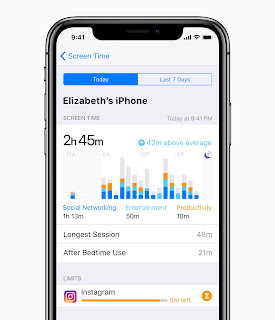Reflecting on my relationship with technology, I think I am balanced with using some apps but not others. With Instagram and Snapchat, I have a healthy relationship because I use each one infrequently and for less than 30 minutes each time. I do not engage with these sites often or for long periods of time. However, there are other apps like TikTok, Netflix, and Prime Video that I use for hours each day. My overall outlook is that I need my phone at all times. Just a few days ago, I lost my phone. In the time it took me to find it, I realized just how dependent I am on my phone. I think it all goes back to childhood. My whole life, I have always had access to a tv, laptop, or ipad. Technology makes me feel comfortable. I love my phone and feel safe when scrolling on it.
Reviewing my iphone’s screen time averages, I am consistent with using social apps for approximately 6.5 hours each day. I think a more appropriate amount of time would be 3 hours a day for recreational phone use, since I have to use technology so much for school and work every day. I feel like through TikTok and Instagram, I learn new things every day. Seeing videos about nature teaches me animal facts I would have never found otherwise. Popular restaurants and trending menus show me cool places to check out when I travel. Even with friends and family, I learn about what is going on in their lives, even if I haven’t seen that person in a long time. Some inaccurate information probably reaches me online, but nothing in particular stands out. That is why I don’t worry much about technology. For the most part, it helps me in life with relationships, school work, learning new things, and making connections.
I’ve never fully quit social media. I do try to not go on apps so much and give myself a day or two of not clicking on that app. But I’ve never completely quit using it entirely. When TikTok disappeared in January this year, I went on Instagram reels instead. Switching to this app was less convenient but still effective for watching short videos and learning new things. While I am happy that TikTok was not blocked permanently, I wouldn’t cry over its ban, I would just miss it. I am happy spending time outside of my phone hanging out with friends and family, cooking meals, working out, and exploring new places. I think that makes my relationship with technology mostly healthy. I don’t use technology because I have to, I use it because I want to.
The information about me that lives online is not much and is certainly out of date. When searching my name, the results on Google show some pictures from my high school yearbook and a link to my LinkedIn profile. Even then, the privacy settings keep someone from seeing exact details on my public resume. These results give the impression that I don’t use social media much in a public way. I haven't really done anything to leave a stamp online, which helps my profession start off on a clean slate. Since I haven’t started my career yet, I am looking forward to building a platform in the future.
This semester, creating a blog helped me explore what it is like to create content online. I don’t think everyone should have a blog, but it is a good option for people who like writing and reflecting about topics. Creating a blog for Media Law and Literacy made me more thoughtful. I found it satisfying to research new topics, get pictures, and format the layouts for each post. Some cons of blogging or posting publicly on social media are that anyone can see it online. Sometimes people don’t like your opinions or don’t agree with you. Other times, social media can empower people, helping someone to feel motivated to take action. I learned that there are some limitations with posting online, such as figuring out how to navigate technical difficulties. This semester’s blog also took a lot of time and commitment in order to read, write, and post. For future students, I recommend that they make sure to put in effort and research everything they plan to talk about.









